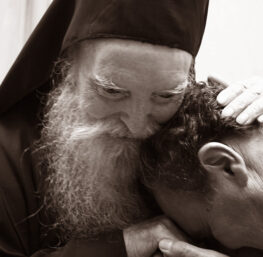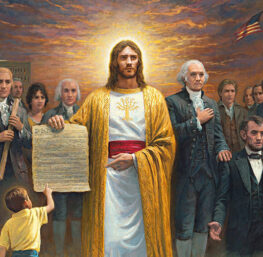First Things | by Joseph Bottum | December 2009
It’s a nudge here and a shove there. A push from one side and a kick from another. Little things, for the most part, and surprisingly often the perpetrators retreat when directly challenged, but only to watch someone else step in to take their place. And the Christian churches have responded to all the recent thumps and torments with the bumbling confusion of a schoolboy giant.
You remember that boy from the schoolyard: an overgrown child, harassed by a ring of nimble bullies. He’s a little pudgy and a little stupid, good-natured but slow, big but clumsy. He flails around, and he doesn’t believe they actually mean it, and he really only wants to be liked by them— them, all the cruel little boys and girls who think of themselves as clever, all the spiteful little boys and girls who think of themselves as cool. But they never will like him. He’s not clever, and he’s not handsome, and rolls of fat show above his collar. If he ever does shove back, they can run to the teacher to complain that the big kid hurt them, and, meanwhile, tormenting the confused boy makes them feel brave and superior and quick.
So the California court penalizes doctors for referring a patient to another clinic because they didn’t want to perform in-vitro fertilization for an unmarried couple. A state representative in Connecticut submits legislation that would force the Catholic Church to divest itself of its parishes. A judge in Montana decides that healthcare providers are required to arrange for euthanasia when a patient requests it. The Equal Employment Opportunity Commission rules against a college in North Carolina for attempting not to provide its employees with health insurance that covers contraception. A charity in Massachusetts is forced out of the adoption business. The Ninth Circuit attempts to compel a park to remove a memorial cross rather than trade the land with the cross into private hands.
A New Hampshire divorce court orders a Christian mother to stop homeschooling because her daughter “appeared to reflect her mother’s rigidity on questions of faith.” The president allows a diminished form of funding for faith-based institutions to continue, but only if these religious organizations stop hiring on the basis of their religion. An Illinois druggist is ordered to dispense abortifacients or to close his business. The blizzard of lawsuits to ban Christmas displays is beginning to fall on us once again, the most bizarre of the nation’s holiday traditions.
Not one of these is a vital wound to the practice of American religion. Even together, they don’t add up to anything like a deathblow. Conservatives shouldn’t give in to the temptation to think that the rise of their political opponents portends the crushing of faith, anymore than the left should have declared that the administration of George W. Bush meant the creation of American theocracy. Remember all those anti-Bush books back in 2005 and 2006—James Rudin’s The Baptizing of America, and Michelle Goldberg’s Kingdom Coming, and Kevin Phillips’ American Theocracy, and their ilk? They seemed nutty then, and they look even nuttier in hindsight, and it would be almost as nutty for the political right to imagine today that the nation is on the edge of throwing Christians to the lions—or that our situation is comparable to that of places with real and deadly persecution: Tibet, or Sudan, or Vietnam, or Timor, or India. Besides, American exceptionalism has always depended on the fact that our major political parties do not line up perfectly with religious voters on one side and anti-religious voters on the other. America ceases to be much of an America the day we arrive at something like Europe’s old political divisions of Christian Democrats on one side and Socialists on the other.
Still, America’s religious believers are not wrong to feel ringed in, somehow—teased and ragged and bullied and pressed in on. And they have responded, generally, like the bewildered boy surrounded by bullies. Take Fr. John Jenkins, the president of Notre Dame, for example. This is not a stupid man. At the very least, he’s one of those sharp, get-ahead people with an ability to tell which way the wind is blowing. And there’s no gainsaying the fact that, with healthcare reform, changes in the tax code, and homosexual rights routinely posed against religion, the wind is blowing hard against Notre Dame and all the other limicole institutions—hospitals, schools, and charities—that stand between the Catholic Church and the state. But somehow, despite his cleverness, Jenkins has chosen the big, tormented, clumsy boy’s solution: stupidly hoping that the cool kids will like him if he tries to do the same things they do. They won’t, and in the meantime he succeeds mostly at kindling anger in all the pro-life people who ought to wish Notre Dame well.
Or take the case of the Equal Employment Opportunity Commission’s ruling against Belmont Abbey College in North Carolina for denying insurance coverage of contraceptives for its employees. The story has many ins and outs—the best analysis I’ve read is Rabbi Yaakov Menken’s in the Baltimore Sun, perhaps not surprisingly, since Orthodox Jews have a stake in this fight, too—but, in many ways, it has followed thus far the usual pattern of such things: A religious institution takes a stand, and a government agency rules against that stand (in this case, under the somewhat peculiar reasoning that it discriminates against women), and the school’s appeals for publicity are not ignored. The machine goes to work publicizing the case, with mentions in the Wall Street Journal, and the Weekly Standard, and Fox News. The high-powered religious-rights law organizations provide their expertise, and, though the case is still pending, most legal scholars seem fairly confident that the school will eventually prevail in court.
What Belmont Abbey did is the right thing; if you’re going to be a Catholic school, then, by God, be a Catholic school. But it is one of the bullied boy’s solutions, as well: a lashing out, with the whole weight of the conservative press, against a specific abuse. Belmont Abbey could hardly do otherwise; it’s not the job of that small but serious college to fight all the wrongs of Christendom. Religious believers in general, however, will not be helped if Belmont Abbey prevails, because the problem is not a few rogue bureaucrats at the Equal Employment Opportunity Commission. The problem is not the strange jurisprudence coming from the Ninth Circuit Court of Appeals. The problem is not the mainstream media’s distaste for Christianity.
The problem is not any one abuse or even the sum of them. No, the real problem is that Christians in America today feel embattled and hemmed in—nagged and teased and bullied from a hundred directions. This is not a good situation for the Church, and it is a terrible situation for the nation. To travel much among believers is to feel a growing sense that the day is rapidly coming when religious people will not have the freedom to live ordinary lives in accord with their faith. Oh, the Amish option is always available: Retreat from the world, forego the technologies and enjoyments that others have, and build an isolated refuge. But, otherwise, the ordinary things of life seem increasingly to require not just acquiescence but participation. You must not just allow gambling to exist, but you must be dependent on its tax revenues for public services. You must not just allow pornography to be sold, but you must be confronted with it. To be a Catholic doctor is close to a contradiction. To be an evangelical pharmacist is already one, in some jurisdictions. Even to preach against homosexuality is a crime, according to some Canadian human-rights commissions, and within a few years clergy in the churches that do not perform same-sex marriages will be stripped of their power to perform state-recognized marriages.
Two freedoms are at risk: the freedom of conscience for individuals and the freedom of religion for churches. The loss of either of these will damage the nation, and the reaction against the loss will damage the nation even more. But these are the dangers with which we are threatened, by forces determined to shame Christian belief, abolish Christian rhetoric, and prohibit Christian argument, as they strip the public square of its religious dress. All this, and more, is imperiled by a world increasingly bent on compelling not merely our silence but ultimately our participation in its sins, crimes, and follies—its pornographies, infanticides, and redefinitions of human nature.
Too many of the churches are giving in. The great historical presence of Christian witness, the moral force that derives from faith in Jesus Christ, is equally endangered by the growing acquiescence of the Christian churches. Harried by law and social pressure, the churches have begun to beg off the duty to which they have been called by God—the duty to stand up before their cultured despisers and say what must be said by those who believe it: that faith in Jesus Christ is the cure for the diseases of our time, that all human beings are endowed with the dignity and worth of having been made in God’s image, and that the universal truths established by God at the foundation of the world remain the universal truths of human existence today.
In a truly democratic society, individuals must be free to speak, act, work, vote, and live according to the conscience formed by the commitment to first principles that come with faith in Jesus Christ. In a truly democratic society, churches must be free to proclaim the gospel, denounce sin, perform acts of charity, and defend the lives of the weakest and most vulnerable.
As Catholics, Orthodox, and Protestants of many denominations, Christian believers do not hold all the same beliefs. But all believers must stand up now and make a declaration. We must demand from the powers of the world genuine freedom for believers: the freedom to earn their livings, the freedom to educate their children, the freedom to practice their charities, and the freedom to speak the truth—all without compulsion to violate, along the way, the conscience formed by faith in Jesus Christ.
We must demand, as well, genuine freedom for the churches: the freedom to proclaim the gospel, the freedom to persuade conversions, the freedom to make the case for Christianity by participating in public discourse, the freedom to operate charitable and educational organizations, and the freedom to decry sin wherever it is found.
Finally, we must call the churches of every Christian denomination to cast off their torpor and compliance—to shed their fear of scorn and disapproval. The churches must take up their first and greatest duty: the proclamation of the Gospel of Life in a time increasingly enticed by death—the proclamation of the Gospel of Light in a world increasingly stumbling in darkness.
. . . more



